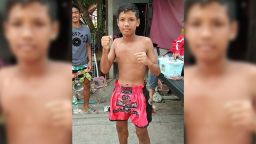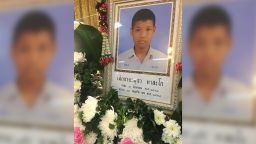Anucha Tasako was just 13 years old when he stepped into the Muay Thai ring to fight a boy just two years older for prize money of around 2,000 Thai Baht ($60).
He’d done it almost 200 times before, but Saturday’s fight was his last.
Anucha died after being knocked unconscious and suffering a hemorrhage at his brain stem, according to Sub. Lt. Rawin Nasomsong, of the Royal Thai Police’s Institute of Forensic Medicine.
The death of the young fighter from Kalasin Province in Thailand’s northeast has led to calls for reform to the sport and its practice of using boys and young men – sometimes as young as seven years old – to compete in professional bouts.
Tourism and Sports Minister Weerasak Kowsurat has vowed to introduce further legislation to the country’s Boxing Act to protect young fighters, the Bangkok Post reports.

The amendment to the country’s Boxing Act would ban all fighters younger than age 12, and require all those between 12 and 15 years old to be provided with safety equipment, especially head guards.
“This draft stipulates the criteria concerning ages of young people who want to compete in this sport,” he said, adding that the Ministry “will rush through the process to forward it to the cabinet for consideration as quickly as possible.”
‘He died like a warrior’
Anucha started practicing Muay Thai at the age of seven or eight, said Damrong Tasako, the teenager’s uncle who raised him from the age of three. Tasako added the teen was “very talented.”
He first fought in the ring when he was eight years old, his uncle told CNN, winning his first match that came with a prize of 300 Thai Baht ($9). The prize money for his match on Saturday was 2,000 Thai Baht ($60).

Anucha wanted to train in Muay Thai because he wanted to earn money to buys things, said Tasako. To date, Anucha has taken part in an estimated 170 fights.
“His dream was he always wanted to be a champion at Lumpini Stadium or Ratchadamneon Stadium,” he said, referring to the two main Muay Thai venues in Bangkok. “Also, if he could he wanted to enter military cadet school.”
When asked about Anucha’s death, his uncle said he didn’t blame anyone. “He died like a warrior. He was a fighter.”
A religious ceremony in honor of the teenager took place Wednesday in Samutprakarn Province, in central Thailand, where his final fight took place. His is body will be cremated Thursday.
Damrong said that they had met his opponent, a boy two years older than Anucha, who paid his respects at the temple where the 13-year-old’s body had been laid in repose.
The older boy had started boxing even earlier, at age 6. He told CNN he had his first paid fight just a year after that.
After Anucha’s death, he says he received a lot of vitriol on social media, but also enormous support.
To honor Anucha’s memory, he’s participating in the boy’s cremation ceremony as a novice monk; Thais can temporarily join a monastery.
However the death of his opponent has not deterred him from stepping into the ring.
“I want to continue on this road as a Muay Thai boxer, and see how far I can go,” he said.
Shining light on the issue
Activists and doctors have tried several times to amend the child boxing bill, but their attempts have never been successful, said Dr. Witaya Sungkarat, chief of the Thai Child Boxers Research Project at Mahidol University, adding that the news of Anucha’s death has just shone a big light on this issue again.
“We have never recommended a total ban of Muay Thai boxing,” said Sungkarat. “But we want them to avoid hitting the head of the child until they are at least 15 years old.”
Get CNN Health's weekly newsletter
Sign up here to get The Results Are In with Dr. Sanjay Gupta every Tuesday from the CNN Health team.
His institute has carried out research scanning the brains of children who take part in Muay Thai and comparing them against children who don’t.
The result has clearly shown that brain development of kids who don’t compete in Muay Thai are different from kids whose heads were hit in matches, said Sungkarat. The results were heeded by the new draft bill, which remains with the Ministry of Tourism and Sports Promotion to review, he added.
Correction: A previous version of this story incorrectly stated the age at which Damrong Tasako began raising his nephew, Anucha.

